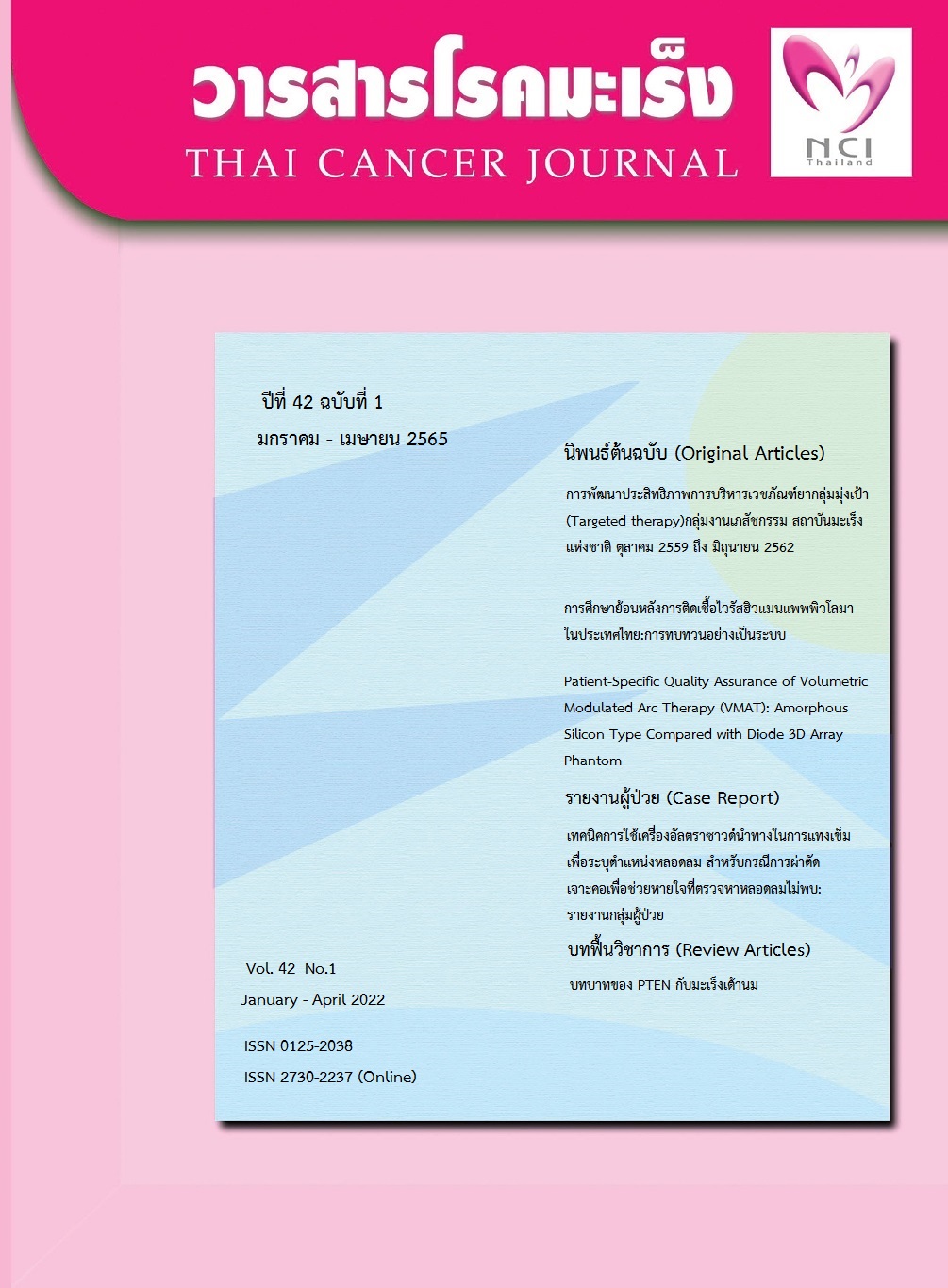เทคนิคการใช้เครื่องอัลตราซาวด์นำทางในการแทงเข็ม เพื่อระบุตำแหน่งหลอดลมสำหรับกรณีการผ่าตัดเจาะคอเพื่อช่วยหายใจที่ตรวจหาหลอดลมไม่พบ: รายงานกลุ่มผู้ป่วย
คำสำคัญ:
เทคนิค, ลตราซาวด์นำทาง, แทงเข็ม, กการผ่าตัดเจาะคอเพื่อช่วยหายใจบทคัดย่อ
การผ่าตัดเจาะคอเพื่อช่วยหายใจในกรณีปกติเป็นหัตถการที่โสต ศอ นาสิกแพทย์ สามารถทำได้โดยไม่ยากนัก แต่ในบางกรณีพบว่าบริเวณลำคอของผู้ป่วยมีลักษณะทางกายวิภาคเปลี่ยนแปลงไปมากจนไม่สามารถหาตำแหน่งหลอดลมที่จะใช้ผ่าตัดได้ เช่น กลุ่มผู้ป่วยมะเร็งศีรษะและลำคอ ซึ่งมักจะมีก้อนขนาดใหญ่หรือพังผืดที่คอ ส่งผลทำให้ไม่สามารถมองเห็นหรือคลำตำแหน่งหลอดลมได้ ผู้เขียนได้คิดค้นและพัฒนาเทคนิคการใช้เครื่องอัลตราซาวด์นำทางในการแทงเข็มเพื่อระบุตำแหน่งหลอดลมสำหรับกรณีการผ่าตัดเจาะคอเพื่อช่วยหายใจที่ตรวจหาหลอดลมไม่พบเพื่อช่วยแก้ปัญหาในกรณีดังกล่าว พบว่าช่วยให้สามารถระบุตำแหน่งหลอดลมก่อนและขณะทำการผ่าตัดได้อย่างมีประสิทธิภาพมากขึ้น ทำให้ผ่าตัดได้รวดเร็วและปลอดภัย อย่างไรก็ตามอาจมีข้อจำกัดอยู่บ้างในกรณีการผ่าตัดแบบ Local anesthesia ซึ่งผู้ป่วยมีการเคลื่อนไหวร่างกาย และข้อจำกัดด้านประสบการณ์ในการใช้เครื่องอัลตราซาวด์นำทางในการแทงเข็มของโสต ศอ นาสิกแพทย์ ซึ่งจะต้องมีการปรับปรุงพัฒนาเทคนิค เครื่องมือ และฝึกอบรมโสต ศอ นาสิกแพทย์ เพื่อให้สามารถใช้เทคนิคนี้ได้อย่างมีประสิทธิภาพและแพร่หลายต่อไป
เอกสารอ้างอิง
Kristensen MS, Teoh WH. Ultrasonography in airway management. Hagberg and Benumof's airway management. 4th ed. Philadelphia: Elsevier 2018. p.74-91.
Garg R, Gupta A. Ultrasound: A promising tool for contemporary airway management. World J Clin Cases 2015;3(11):926-9.
Ziyaeifard M, Totonchi Z. Real-time ultrasound guided the new standard technique for percutaneous dilatational tracheostomy (PDT). Anesth Pain Med 2015;5(3):e24653.
Alansari M, Alotair H, Al Aseri Z, Elhoseny MA. Use of ultrasound guidance to improve the safety of percutaneous dilatational tracheostomy: a literature review. Crit Care 2015;19:229.
Rajajee V, Williamson CA, West BT. Impact of real-time ultrasound guidance on complications of percutaneous dilatational tracheostomy: a propensity score analysis. Crit Care 2015;19:198.
Yavuz A, Yilmaz M, Goya C, Alimoglu E, Kabaalioglu A. Advantages of US in percutaneous dilatational tracheostomy: randomized controlled trial and review of the literature. Radiology 2014;273(3):927-36.
Reed CR, Haines KL, Agarwal SK. Tracheostomy. Current surgical therapy. 13th ed. Philadelphia: Elsevier; 2020. p.1394-404.
Munir N, Hughes D, Sadera G, Sherman IW. Ultrasound-guided localisation of trachea for surgical tracheostomy. Eur Arch Otorhinolaryngol 2010;267(3):477-9.
Muhammad JK, Patton DW, Evans RM, Major E. Percutaneous dilatational tracheostomy under ultrasound guidance. Br J Oral Maxillofac Surg 1999;37(4):309-11.
Cheung NH, Napolitano LM. Tracheostomy: epidemiology, indications, timing, technique,and outcomes. Respir Care 2014;59(6):895-915; discussion 6-9.
Chen X, Zhai W, Yu Z, Geng J, Li M. Determining correct tracheal tube insertion depth by measuring distance between endotracheal tube cuff and vocal cords by ultrasound in Chinese adults: a prospective case-control study. BMJ Open 2018;8(12):e023374. Published 2018 Dec 6. doi:10.1136/bmjopen-2018-023374.
You-Ten KE, Siddiqui N, Teoh WH, Kristensen MS. Point-of-care ultrasound (POCUS) of the upper airway. Can J Anaesth. 2018 Apr;65(4):473-484. English. doi: 10.1007/s12630-018-1064-8. Epub 2018 Jan 18. PMID: 29349733.
Gottlieb M, Holladay D, Burns KM, Nakitende D, Bailitz J. Ultrasound for airway management: An evidence-based review for the emergency clinician. Am J Emerg Med. 2020 May;38(5):1007-1013. doi: 10.1016/j.ajem.2019.12.019. Epub 2019 Dec 11. PMID: 31843325
ดาวน์โหลด
เผยแพร่แล้ว
เวอร์ชัน
- 2022-04-29 (2)
- 2022-04-29 (1)
ฉบับ
ประเภทบทความ
สัญญาอนุญาต
ลิขสิทธิ์ (c) 2022 มูลนิธิสถาบันมะเร็งแห่งชาติ

อนุญาตภายใต้เงื่อนไข Creative Commons Attribution-NonCommercial-NoDerivatives 4.0 International License.
บทความทีตีพิมพ์ในวารสารโรคมะเร็งนี้ถือว่าเป็นลิขสิทธิ์ของมูลนิธิสถาบันมะเร็งแห่งชาติ และผลงานวิชาการหรือวิจัยของคณะผู้เขียน ไม่ใช่ความคิดเห็นของบรรณาธิการหรือผู้จัดทํา






